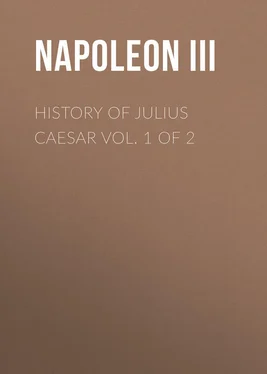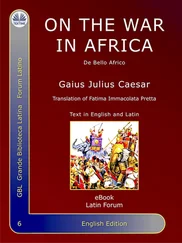Napoleon III - History of Julius Caesar Vol. 1 of 2
Здесь есть возможность читать онлайн «Napoleon III - History of Julius Caesar Vol. 1 of 2» — ознакомительный отрывок электронной книги совершенно бесплатно, а после прочтения отрывка купить полную версию. В некоторых случаях можно слушать аудио, скачать через торрент в формате fb2 и присутствует краткое содержание. Жанр: foreign_antique, foreign_prose, Биографии и Мемуары, на английском языке. Описание произведения, (предисловие) а так же отзывы посетителей доступны на портале библиотеки ЛибКат.
- Название:History of Julius Caesar Vol. 1 of 2
- Автор:
- Жанр:
- Год:неизвестен
- ISBN:нет данных
- Рейтинг книги:5 / 5. Голосов: 1
-
Избранное:Добавить в избранное
- Отзывы:
-
Ваша оценка:
- 100
- 1
- 2
- 3
- 4
- 5
History of Julius Caesar Vol. 1 of 2: краткое содержание, описание и аннотация
Предлагаем к чтению аннотацию, описание, краткое содержание или предисловие (зависит от того, что написал сам автор книги «History of Julius Caesar Vol. 1 of 2»). Если вы не нашли необходимую информацию о книге — напишите в комментариях, мы постараемся отыскать её.
History of Julius Caesar Vol. 1 of 2 — читать онлайн ознакомительный отрывок
Ниже представлен текст книги, разбитый по страницам. Система сохранения места последней прочитанной страницы, позволяет с удобством читать онлайн бесплатно книгу «History of Julius Caesar Vol. 1 of 2», без необходимости каждый раз заново искать на чём Вы остановились. Поставьте закладку, и сможете в любой момент перейти на страницу, на которой закончили чтение.
Интервал:
Закладка:
The plebeians laid claim to all the offices of state, and especially to the consulship, refusing to enrol themselves until their demands had been satisfied; and they went so far in their claims that they insisted upon the plebeian origin of the kings. “Shall we, then,” cried the tribune Canuleius, addressing himself to the people, “have consuls who resemble the decemvirs, the vilest of mortals, all patricians, rather than the best of our kings, all new men!” that is, men without ancestors. 114 114 Titus Livius, IV. 3.
The Senate resisted, because it had no intention of conferring upon plebeians the right which formed an attribute of the consuls, for the convocation of the comitia, of taking the great auspices, a privilege altogether of a religious character, the exclusive apanage of the nobility. 115 115 “The indignation of the people was extreme, on account of the refusal to take the auspices, as if it had been an object for the reprobation of the immortal gods.” – “The tribune demanded for what reason a plebeian could not be consul, and was told in reply that the plebeians had not the auspices, and that the decemvirs had interdicted marriage between the two orders only to hinder the auspices from being troubled by men of equivocal birth.” (Titus Livius, IV. 6.) – “Now in what hands are the auspices according to the custom of our ancestors? In the hands of the patricians, I think; for the auspices are never taken for the nomination of a plebeian magistrate.” – “Is it not then the same thing as to annihilate the auspices in this city, to take them, in electing plebeian consuls, from the patricians, who alone can observe them?” (Year of Rome 386.) (Titus Livius, VI. 41.) To the consul, the prætor, and the censor was reserved the right of taking the great auspices; to the less elevated magistracies that of taking the lesser ones. The great auspices appear, in fact, to have been those of which the exercise was of most importance to the rights of the aristocracy. The ancients have not left us a precise definition of the two classes of auspices; but it appears to result from what Cicero says of them ( De Legibus , II. 12), that by the great auspices were understood those for which the intervention of the augurs was indispensable; the little auspices, on the contrary, were those which were taken without them. (See Aulus Gellius, XIII. 15.) As to the auspices taken in the comitia where the consular tribunes were elected, passages of Titus Livius (V. 14, 52; VI. 11) prove that they were the same as for the election of the consuls, and consequently that they were the great auspices; for we know from Cicero ( De Divinatione , I. 17; II. 35 – compare Titus Livius, IV. 7) that it was the duty of the magistrate who held the comitia to bring there an augur, of whom he demanded what the presages announced. The privileges of the nobility were maintained by causing the comitia for the election of the consular tribunes to be held by an interrex chosen by the aristocracy.
In order to obviate this difficulty, the Senate, after suppressing the legal obstacles in the way of marriages between the two orders, agreed in 309 to the creation of six military tribunes invested with the consular power; but, which was an essential point, it was the interrex who convoked the comitia and took the auspices. 116 116 Titus Livius, VI. 5.
During seventy-seven years the military tribunes were elected alternately with the consuls, and the consulship was only re-established permanently in 387, when it was opened to the plebeians. This was the result of one of the laws of Licinius Stolo. This tribune succeeded in obtaining the adoption of several measures which appeared to open a new era which would put an end to disputes. Still the patricians held with such tenacity to the privilege of alone taking the auspices, that in 398, in the absence of the patrician consul, an interrex was appointed charged with presiding over the comitia, in order not to leave this care to the dictator, and the other consul, who were both plebeians. 117 117 Titus Livius, VII. 17.
But in permitting the popular class to arrive at the consulship, care had been taken to withdraw from that dignity a great part of its attributes, in order to confer them upon patrician magistrates. Thus they had successively taken away from the consuls, by the creation of two questors, in 307, the administration of the military chest; 118 118 In 333, the number was increased to four. Two, overseers for the guard of the treasury and the disposition of the public money, were appointed by the consuls; the two others, charged with the administration of the military chest, were appointed by the tribes.
by the creation of the censors, in 311, the right of drawing up the list of the census, the assessment of the revenue of the State, and of watching over public morals; by the creation of the prætors, in 387, the sovereign jurisdiction in civil affairs, under the pretext that the nobility alone possessed the knowledge of the law of the Quirites; and lastly, by the creation of the curule ediles, the presidency of the games, the superintendence of buildings, the police and the provisioning of the town, the maintenance of the public roads, and the inspection of the markets.
The intention of the aristocracy had been to limit the compulsory concessions; but after the adoption of the Licinian laws, it was no longer possible to prevent the principle of the admission of plebeians to all the magistracies. In 386 they had arrived at the important charge of master of the knights ( magister equitum ) who was in a manner the lieutenant of the dictator ( magister populi ); 119 119 “ The master of the knights was so called because he exercised the supreme power over the knights and the accensi , as the dictator exercised it over the whole Roman people; whence the name of master of the people , which was also given to him.” (Varro, De Lingua Latina , V. 82, edit. Müller.)
in 387 access to the religious functions had been laid open to them; 120 120 “The duumvirs charged with the sacred rites were replaced by the decemvirs, half plebeians, half patricians.” (Titus Livius, VI. 37.)
in 345 they obtained the questorship; in 398, the dictatorship itself; in 403, the censorship; and lastly, in 417, the prætorship.
In 391, the people arrogated the right of appointing a part of the legionary tribunes, previously chosen by the consuls. 121 121 Titus Livius, VII. 5.
In 415, the law of Q. Publilius Philo took from the Senate the power of refusing the auctoritas to the laws voted by the comitia, and obliged it to declare in advance if the proposed law were in conformity with public and religious law. Further, the obligation imposed by this law of having always one censor taken from among the plebeians, opened the doors of the Senate to the richest of them, since it was the business of the censor to fix the rank of the citizens, and pronounce on the admission or exclusion of the senators. The Publilian law thus tended to raise the aristocracy of the two orders to the same rank, and to create the nobility ( nobilitas ), composed of all the families rendered illustrious by the offices they had filled.
Elements of Dissolution.
IV. At the beginning of the fifth century of Rome, the bringing nearer together of the two orders had given a greater consistence to society; but, just as we have seen under the kingly rule, the principles begin to show themselves which were one day to make the greatness of Rome, so now we see the first appearance of dangers which will be renewed unceasingly. Electoral corruption, the law of perduellio, slavery, the increase of the poor class, the agrarian laws, and the question of debts, will come, under different circumstances, to threaten the existence of the Republic. Let us summarily state that these questions, so grave in the sequel, were raised at an early date.
Читать дальшеИнтервал:
Закладка:
Похожие книги на «History of Julius Caesar Vol. 1 of 2»
Представляем Вашему вниманию похожие книги на «History of Julius Caesar Vol. 1 of 2» списком для выбора. Мы отобрали схожую по названию и смыслу литературу в надежде предоставить читателям больше вариантов отыскать новые, интересные, ещё непрочитанные произведения.
Обсуждение, отзывы о книге «History of Julius Caesar Vol. 1 of 2» и просто собственные мнения читателей. Оставьте ваши комментарии, напишите, что Вы думаете о произведении, его смысле или главных героях. Укажите что конкретно понравилось, а что нет, и почему Вы так считаете.












